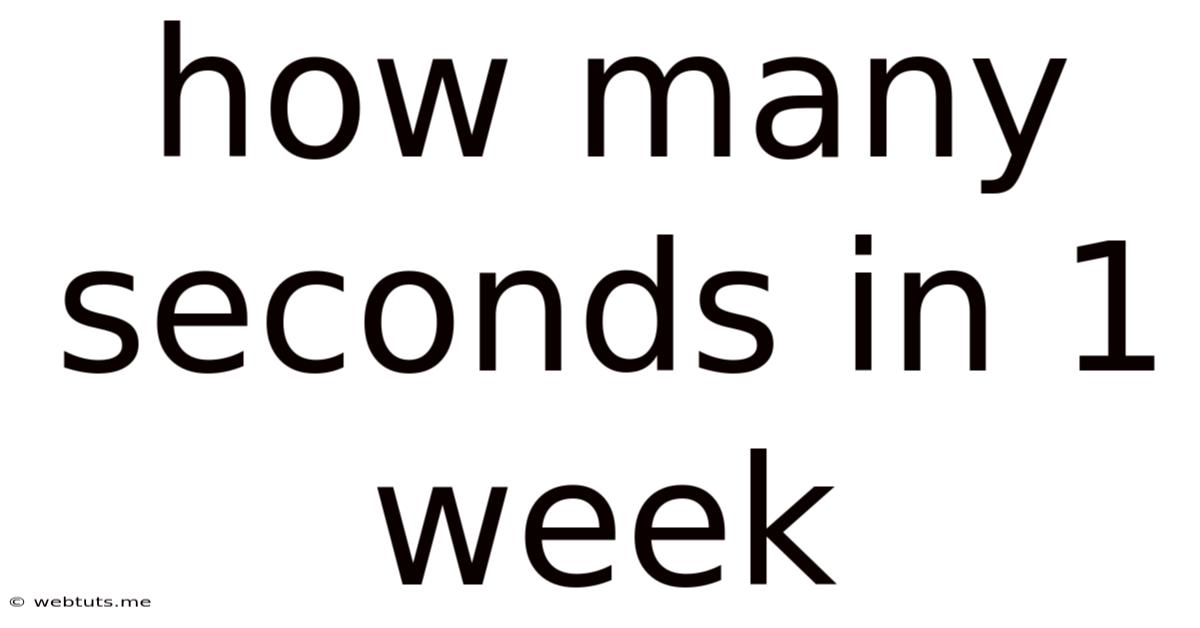How Many Seconds In 1 Week
Webtuts
May 12, 2025 · 4 min read

Table of Contents
How Many Seconds are There in a Week? A Deep Dive into Time Calculation
Have you ever wondered exactly how many seconds are packed into a single week? It's a question that might seem simple at first, but unraveling the calculation reveals a fascinating journey into the intricacies of time measurement. This comprehensive guide will not only answer that question definitively but will also explore the underlying concepts of time units, provide helpful calculation methods, and even touch upon the historical context of how we measure time.
Understanding the Building Blocks of Time
Before diving into the calculation of seconds in a week, let's establish a firm foundation by reviewing the fundamental units of time:
Seconds: The Base Unit
The second (s) is the International System of Units (SI) base unit of time. It's the fundamental building block upon which all other time units are built. Its definition is remarkably precise, based on the transition frequency of the cesium atom.
Minutes, Hours, Days: Building Upwards
From the second, we build upwards:
- Minute (min): 60 seconds make up one minute.
- Hour (hr): 60 minutes constitute an hour.
- Day (day): A day is typically defined as 24 hours, although the precise length can vary slightly due to the Earth's rotation.
Weeks: The Target Unit
Finally, we arrive at the week, our target unit for this calculation. A week is universally accepted as consisting of 7 days.
Calculating the Seconds in a Week: Step-by-Step
Now, armed with this foundational knowledge, we can embark on the calculation:
- Seconds in a Minute: There are 60 seconds in 1 minute.
- Seconds in an Hour: Since there are 60 minutes in an hour, there are 60 seconds/minute * 60 minutes/hour = 3600 seconds in 1 hour.
- Seconds in a Day: With 24 hours in a day, we have 3600 seconds/hour * 24 hours/day = 86,400 seconds in 1 day.
- Seconds in a Week: Finally, multiplying the seconds per day by the number of days in a week gives us: 86,400 seconds/day * 7 days/week = 604,800 seconds in 1 week.
Therefore, the answer to our initial question is: There are 604,800 seconds in one week.
Exploring Variations and Considerations
While the calculation above provides the standard answer, let's delve into some potential variations and considerations:
Leap Seconds
The Earth's rotation isn't perfectly consistent. To account for these slight variations, leap seconds are occasionally added to Coordinated Universal Time (UTC). These leap seconds are usually added at the end of June or December. This means that in a year with a leap second, there will be one extra second, affecting the total number of seconds in a year and therefore indirectly impacting the number of seconds in a week within that specific year. However, the impact is minimal on the overall calculation for a standard week.
Different Calendars
Our calculations are based on the Gregorian calendar, which is the most widely used calendar system globally. Other calendar systems, such as the Julian calendar, have slightly different structures, which could subtly influence the calculation of seconds in a week. The differences, however, would still be negligible for practical purposes.
Time Zones
Time zones are geographical regions that observe a uniform standard time. While time zones don't affect the intrinsic number of seconds in a week, they influence the local time at which the week begins and ends. The number of seconds remains constant regardless of geographical location.
Practical Applications and Real-World Examples
Understanding the number of seconds in a week has applications in various fields:
- Software Development: Precise time calculations are crucial in software development, particularly in applications involving scheduling, timing events, and handling timestamps.
- Scientific Research: Accurate timekeeping is fundamental to scientific research, especially in fields like astronomy, physics, and meteorology.
- Data Analysis: When analyzing time-series data, converting time units to seconds can simplify calculations and comparisons.
- Project Management: Project managers can break down large tasks into smaller, time-based units (seconds, minutes, hours) for better planning and tracking.
- Financial Modeling: Financial models often rely on precise time-based calculations for interest accruals and asset valuations.
Historical Context of Time Measurement
Our current system of time measurement is the result of centuries of refinement. Early civilizations relied on natural phenomena, such as the sun's movement, to measure time. The development of increasingly accurate clocks and timekeeping devices has played a critical role in shaping our understanding and measurement of time. The consistent refinement of timekeeping instruments, from sundials to atomic clocks, reflects humanity's relentless pursuit of precision and accuracy.
Conclusion: The Significance of Precise Timekeeping
The simple question of "how many seconds in a week?" opens a gateway to a deeper exploration of time, its measurement, and its significance in various aspects of our lives. From the fundamental units of seconds and minutes to the complexities of leap seconds and different calendar systems, the journey into precise timekeeping reveals a fascinating interplay of scientific understanding, historical development, and practical applications. The seemingly straightforward answer – 604,800 seconds – holds far more weight than initially apparent, underlining the crucial role of precise timekeeping in our modern world. We hope this detailed explanation helps you understand and appreciate the intricate details behind this seemingly simple question.
Latest Posts
Latest Posts
-
How Many Seconds In 5 Mins
May 12, 2025
-
How Many Hours Is 131 Minutes
May 12, 2025
-
55 Mph To Feet Per Second
May 12, 2025
-
How Much Is 36kg In Pounds
May 12, 2025
-
How Many More Days Until February 10th
May 12, 2025
Related Post
Thank you for visiting our website which covers about How Many Seconds In 1 Week . We hope the information provided has been useful to you. Feel free to contact us if you have any questions or need further assistance. See you next time and don't miss to bookmark.